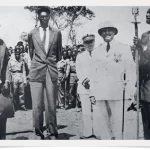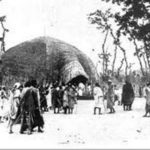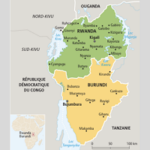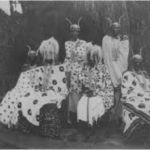Musinga and the White Fathers
This attempt at better relations foundered on the excessive demands and tactless behavior of the Fathers. Musinga feared the power they came to exercise through the massive wood-transporting operation, andhe resented their abuse of his notables who did not comply rapidly with the priests’ orders. In addition, the Fathers offended Musinga and his counselors by disregarding his explicit prohibition against felling or damaging any of several kinds of trees that were associated with the spirits of past bami, or were thought for some other reason to embody imana, the dynamic force of creation. In one instance, the Fathers tried to dynamite one particularly venerable tree that was identified with the spirit of the great mwami Ruganzu Ndori. The Court and many ordinary Rwandans too must have been pleased when European technical skill proved insufficient to uproot the giant tree.
In the early months of 1906 Musinga’s growing distrust of the Fathers drove him once more into accepting the guidance of Kanjogera, Kabare, and their nephew Rwidegembya, who was increasingly favored by Kanjogera. Under their influence, Musinga came into conflict with the missionaries over their client Léon Rutwaza, a Tutsi who had lost his commands in land and cattle some time before to his uncles who were influential at Nyanza. Rutwaza had then sought employment and protection from the Fathers and had converted to Christianity. After their hard struggle to obtain a site at Kabgayi in central Rwanda, the Fathers had lacked the missionaries to establish the post immediately. In the meantime they erected some temporary buildings, which they left under the charge of Rutwaza, who was also to supervise building a more permanent station. The Fathers, like Rwandan notables, had taken charge of a new domain, then moved on to other areas, leaving a favorite to represent them. And like many such representatives in the absence of their superiors, Rutwaza abused his powers to increase his influence in the area, especially on the hills commanded by his uncles. When Rutwaza began demanding labor and gifts from Hutu, they complained to their customary superiors, who included Kabare and Rwidegembya. Since the area around Kabgayi was one of the major regions from which notables “drew their milk,” Kabare and Rwidegembya were angered both by Rutwaza’s exercise of authority and by the loss to him of wealth that might otherwise have been theirs. Musinga protested to the Fathers and asked them to withdraw Rutwaza from Kabgayi, but they took offense at the request and decided to defend their man. When the missionaries heard rumors that Musinga was planning to execute Rutwaza, one went immediately to Nyanza to express his anger at the accusations against his client: he even went so far as to threaten the mwami or anyone else who injured Rutwaza.
To his dismay the Father found the Court unmoved by his intimidation. As he wrote, “After all we know it well; they are mocking us: they know that we need their help and they wish to show us that they alone command in Rwanda.”The new confidence of the Court rested on recent reassurances given them by the Germans. In September 1905, after an absence of three years in Germany, Kandt had returned to Rwanda “talking as if he were to be Resident,” as one of the Fathers commented acidly.In 1905 Rwanda and Burundi had each been put under a civilian Resident who was to exercise his authority through the mwami. Captain von Grawert was originally named to hold the two offices concurrently. Since he spent the greater part of his time in Bujumbura, he or his superiors had arranged for Kandt to act as a semi-official representative on the spot.Musinga had granted Kandt some land in Nyantango, two days distant from Nyanza, where he devoted his efforts mostly to scientific research. But Kandt remained in close touch with the Court. His admiration for the Rwandan political system and his desire to aid the mwami in strengthening his authority made him an effective advocate for Musinga with von Grawert. When the official Resident visited Rwanda in February 1906, he had fresh in his mind the recent Maji-Maji rebellion that had devastated a large area of German East Africa. Kandt accompanied him to Nyanza, where the Court elaborated on all the recent demands of the Fathers. Von Grawert apparently indicated to the Court that he would make the Fathers moderate their requests and improve their behavior. And so, when a Father passed by Kabgayi right after von Grawert’s visit at Nyanza, he heard rumors that the Resident would expel the missionaries from this new station, or that if he allowed them to remain he would forbid them to demand labor from the people on surrounding hills.
Soon after Kandt presented the German message directly to the Fathers: the authorities feared another outbreak in East Africa that might spread to Rwanda; this was hardly the moment to offend the Court by excessive demands. The Germans would not support the requests of the missionaries, who thus had to win the cooperation of the Court by their own efforts, the more diplomatically the better. Kandt suggested that thee Fathers remove Rutwaza and personally supervise all future construction. He warned them that von Grawert had been so annoyed at their involvement in political affairs that he had wanted to place a new military post in Rwanda, primarily to supervise them. Kandt had dissuaded him this time but predicted that he might not be so successful if the question arose again.
https://uk.amateka.net/musinga-and-the-white-fathers/https://uk.amateka.net/wp-content/uploads/2020/05/christian.pnghttps://uk.amateka.net/wp-content/uploads/2020/05/christian-150x150.pngHistory of kingsThis attempt at better relations foundered on the excessive demands and tactless behavior of the Fathers. Musinga feared the power they came to exercise through the massive wood-transporting operation, andhe resented their abuse of his notables who did not comply rapidly with the priests' orders. In addition, the Fathers...BarataBarata rpierre@ikaze.netAdministratorAMATEKA | HISTORY OF RWANDA




